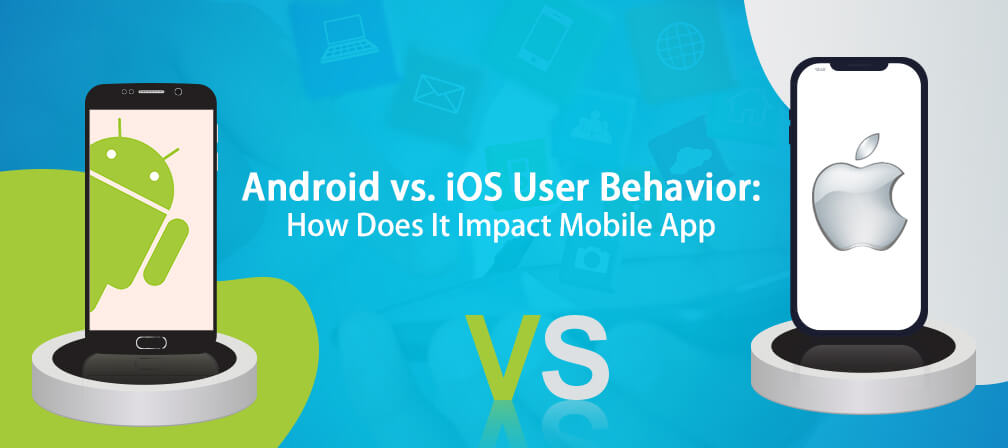
Before stepping into the world of mobile app development, obviously one needs to target their users. Another factor that requires the attention of the businesses is the OS platforms that must be selected for developing the perfect app that fits in accordance with the user necessities.
Talking about the current scenario, there are namely two major giants currently ruling the mobile app development landscape: Android and Apple. According to statistics, around 99.54% of the mobile market is solely dominated by these two platforms. Therefore, the major question that arises here is which one to adopt for?
Now interestingly, in this case, a short research about the user can assist in determining the path of mobile app development. Once you idealize about the types of app, users are looking for and the amount they are ready to invest on a particular app, you can chart more reformed decision for selecting the appropriate platform.
In this post, we will be talking about the iOS and Android platforms, devices, their usability criteria, their impact on your app and the success ratios that incurs with these OS.
As per the recent study, there are around 3.2 millions of apps on the Google Play Store and around more than 2 million apps are queued on the Apple App Store. Undeniably, the figures are alarming and thus, one might think to go with the mobile app development on both the platforms.
On a broader note, the number of downloads is increasing with the every passing day and here if we shed some light on the latest data, the percentage of downloads on both the Google Play Store and Apple App Store multiplied around 30 times in the year 2018. .
If we direct towards the mobile app development and the platform to be selected, the only approach that stands still is to learn about the users’ interest. The second approach that goes in is to analyze the main aim and the purpose of your mobile app. In case if user acquisition is the main goal, Android is the first priority and if you are looking for revenue generation, Apple turns out to be more lucrative.
On one side we have users who are pretty much comfortable when it comes to spending on mobile apps and on another side, there are people that belong to medium sections, means who look forward to the apps that require no investment in installation.
Well, the in-app purchases are more common in the iOS market while the Android best suit the common man. In the context of Mobile App Development, if you are looking for a larger user base, Android is the best choice.
To conclude, it is best to decipher the user intent and to gain some insights on the types of apps they prefer to use. This will help you to find the best route for the mobile app development.
For every user, their smartphone is pretty much special. They feel attached to it either in a conditional or unconditional way. There are some major differences that one can realize while using the iPhone or an Android device. The key areas that impact the user experience corresponding to both the devices are OS updates, notifications, app approval etc. Apple users are habitual to the same UX across all the devices means they believes in straightforward and the direct approach.
On a contrary, Android apps are easy to install and can be very fluently submitted over the Google Play Store. So, if you are processing for the app development, it is best to identify the key areas that the users are looking for. iOS on the one side will require consistency and Android users on the other side will opt for freedom while operating the apps.
Also read: How Much Does It Cost to Create an App?
The acquisition and retention approach differs in both the platforms. Likewise, user acquisition rate in the iOS devices is much higher than that of the Android, the reason being the apps are comprised of leading and more versatile content in the iOS.
Talking about the other side of the coin, Android shares some advantages in the context of the registration, since it is easy when compared with that of iOS.
So, here it is required to set the goal of your mobile app. Determine whether you are looking for the success of your product means generating high revenues is your goal or whether you are looking for the user engagement for the longer run.
One of the out of box choice is to develop the app that runs on both the platforms. However, sometimes it may not be possible to develop the app for both the platforms; therefore, one must consider all the distinctive and quantifying features of the mobile app before proceeding for the app development.
Also read: How Much Does It Cost to Develop an Android App?
Just give a few thoughtful minutes and proper consideration over the platforms that you must select for your app. Therefore, outline a tentative approach leveraging with your user requirements and accordingly select the platform that suits the best.
Just remember, the more your information will be classified, the more is the probability of selecting the right platform for making an app with a mark.



Vipin Jain is the Co-Founder and CEO at Konstant Infosolutions and is in charge of marketing, project management, administration and R&D at the company. With his marketing background, Vipin Jain has developed and honed the company’s vision, corporate structure & initiatives and its goals, and brought the company into the current era of success.
Or send us an email at: [email protected]